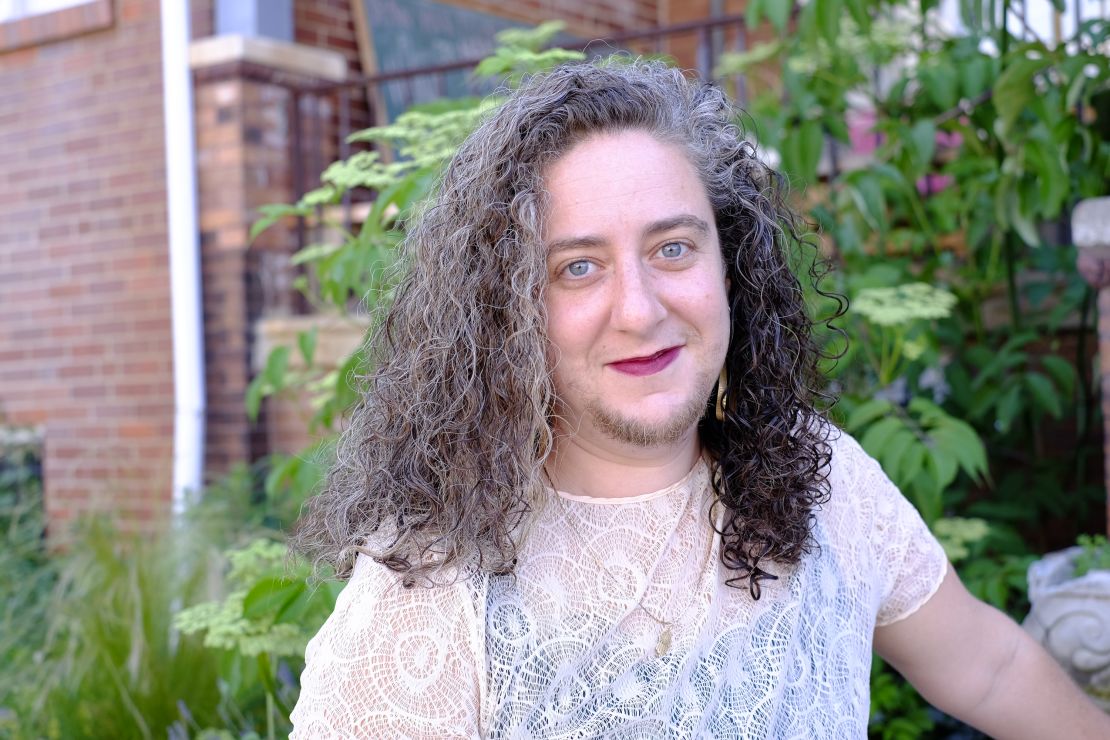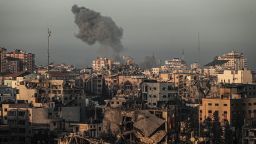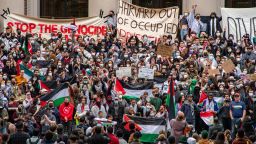https://edition.cnn.com/2023/11/13/...-palestinian-biden-rabbi-rosenberg/index.html
Rabbi Jessica Rosenberg is based in Minneapolis and serves on the Jewish Voice for Peace Rabbinic Council. She is the co-author, with Rabbi Ariana Katz, of “For Times Such as These: a Radical’s Guide to the Jewish Year,” which is due to publish next year, and author of an ”Introduction to Trauma, Healing and Resilience for Rabbis, Jewish Educators and Organizers.” The views in this commentary are her own. Read more opinion at CNN.
CNN —
For days, I’d been marching in the streets of my hometown of Minneapolis, one of thousands of protesters expressing anger and heartache over the deaths of Palestinians in Gaza.

Rabbi Jessica Rosenberg
Erin Bree
Then, I had the sudden inspiration to buy a ticket to a campaign fundraiser for President Joe Biden, who I knew would be coming to town. It was one venue, I thought, where he’d have to hear my appeal.
The ticket to the fundraiser cost me $1,000 — the entry level rate. It’s a lot of money, but it was a small price to pay for the chance to share my thoughts with the president.
I had just one message for Biden: We need an immediate ceasefire in Gaza. Israel must be compelled to stop the shelling of homes and businesses that has claimed more than 11,000 Palestinian lives. As the leader of Israel’s closest ally, Biden is in a unique role to compel the country to comply with a ceasefire.
To be honest, I was worried about how accosting the president could alienate me from Jewish community and my rabbinate. After standing up and challenging the president, where would I be able to pray? What synagogue would have me at the next Shabbat?
But with bombs falling in Gaza, with thousands of Palestinians and Israelis dead and missing, with hostages and prisoners still held in captivity, I knew I had to overcome my worry about the impacts on the people in my social and religious circles.

Opinion: Biden needs to call for a ceasefire and restore respect for international law
I summoned my courage as I rose in the gathering of 200 people earlier this month, where Biden addressed the crowd from the stage.
“Mr. President, if you support the Jewish people, as a rabbi, I need you to call for a ceasefire right now.”
The room filled with gasps of surprise, then with jeers and demands that I “sit down.” Some people in the room even broke into chants of “Four more years!” I suppose that at forums like that, people expect to hear only unconditional support for the candidate.
I was surprised to hear Biden’s calm reply.
“Do you want to hear my answer?” he said. “I think we need a pause. A pause means we give time to get the prisoners out.”
A humanitarian pause in Gaza remains one of the most hotly debated issues of the past several days, even as Israel has commenced with instituting such breaks in its bombardments. Israel last week finally agreed to “tactical” pauses for a few hours each day to allow Gazans in the north to flee south.
Humanitarian aid is direly needed in Gaza right now, as hundreds are dying every day, while others struggle to survive without sufficient food, clean water, electricity or medical supplies.

Opinion: Why college presidents seemed flummoxed
What those advocating for humanitarian pauses had said is that these breaks in bombing would provide an opportunity for desperately needed food and medical aid to get to the people of Gaza. Pauses in the bombardments could also be the moment that Israelis and foreign nationals held hostage by Hamas might be freed and allowed to go home.
We now have evidence of just how little difference a daily pause has brought about: So far the humanitarian aid reaching Gazans is still a relative trickle, and only a handful of hostages have been freed since the Hamas attacks of October 7.
Biden’s words to me at the fundraiser that he supported a pause had given me some measure of hope, but in the days since it’s been replaced first by disappointment and now by horror as I see images of the continuation of death and destruction in Gaza.
After pauses last week, the bombing continues with renewed ferocity and the casualties in Gaza continue to rise. It has become clear that a “pause” offers only a brief reprieve before a resumption of the cruelty. Such a pause, when more violence is coming, cannot truly be called “humanitarian.”
This violence hits me deep in my soul. I was raised in a home where Jewishness was woven into the fabric of our lives, where Judaism was a vibrant, life-giving tradition. I was taught that Jews are not “chosen people” — all people are chosen for unique and powerful relationships to what is sacred. All lives are equally worth saving.
• Ilan Troen: My mother watched her mother die in a pogrom. I was on the phone with my daughter when she was killed in one, too.
• Yasmine Mohammed: Many Palestinians in Gaza hate Hamas.
• Gal Katz: ‘I’m going to funeral after funeral.’ The music festival survivor who hid in an orange grove for 6 hours.
• Yuli Ben Ami: The last text I got from my dad was, ‘They are in the safe room. They caught us.’
• Omar Ghraieb: In Gaza, we have nowhere to run.
• Neta Heiman Mina: Hamas kidnapped my mother, but I condemn Gaza destruction.
• Hani Almadhoun: The gnawing fear of knowing my Palestinian family could be killed at any moment
It has caused me profound anguish to see how centuries of anti-Jewish violence are being used to support a violent political agenda in the form of Israeli militarism. We have seen that decades of war in Afghanistan failed to eradicate al Qaeda and the Taliban. Killing civilians and destroying homes and communities won’t be any more effective against Hamas in Gaza.
Some human rights experts have described the wiping out of entire Palestinian families as genocide. The idea that we will get to peace by a military bombardment is a fiction that lines the pockets of weapons manufacturers and guarantees that Israel will remain in a never-ending cycle of war.
In the meantime, Biden and others in his administration have continued to mince their words, calling time and again for a pause, instead of speaking out loudly and unambiguously for the one thing in Gaza that will truly end the suffering and save innocent lives: a ceasefire.
It was important to me to tell the president that I believe to the core of my being that only a ceasefire — a full and permanent end to the violence — will bring true safety to both Palestinians and Israelis. The overwhelming outpouring of support that I’ve received since taking my stand and addressing the president has invigorated my conviction.
I spoke up earlier this month to amplify the voices of like-minded people whose calls for a ceasefire are echoing around the world. The president once and for all must take the courageous step of answering it.
Rabbi Jessica Rosenberg is based in Minneapolis and serves on the Jewish Voice for Peace Rabbinic Council. She is the co-author, with Rabbi Ariana Katz, of “For Times Such as These: a Radical’s Guide to the Jewish Year,” which is due to publish next year, and author of an ”Introduction to Trauma, Healing and Resilience for Rabbis, Jewish Educators and Organizers.” The views in this commentary are her own. Read more opinion at CNN.
CNN —
For days, I’d been marching in the streets of my hometown of Minneapolis, one of thousands of protesters expressing anger and heartache over the deaths of Palestinians in Gaza.

Rabbi Jessica Rosenberg
Erin Bree
Then, I had the sudden inspiration to buy a ticket to a campaign fundraiser for President Joe Biden, who I knew would be coming to town. It was one venue, I thought, where he’d have to hear my appeal.
The ticket to the fundraiser cost me $1,000 — the entry level rate. It’s a lot of money, but it was a small price to pay for the chance to share my thoughts with the president.
I had just one message for Biden: We need an immediate ceasefire in Gaza. Israel must be compelled to stop the shelling of homes and businesses that has claimed more than 11,000 Palestinian lives. As the leader of Israel’s closest ally, Biden is in a unique role to compel the country to comply with a ceasefire.
To be honest, I was worried about how accosting the president could alienate me from Jewish community and my rabbinate. After standing up and challenging the president, where would I be able to pray? What synagogue would have me at the next Shabbat?
But with bombs falling in Gaza, with thousands of Palestinians and Israelis dead and missing, with hostages and prisoners still held in captivity, I knew I had to overcome my worry about the impacts on the people in my social and religious circles.

Opinion: Biden needs to call for a ceasefire and restore respect for international law
I summoned my courage as I rose in the gathering of 200 people earlier this month, where Biden addressed the crowd from the stage.
“Mr. President, if you support the Jewish people, as a rabbi, I need you to call for a ceasefire right now.”
The room filled with gasps of surprise, then with jeers and demands that I “sit down.” Some people in the room even broke into chants of “Four more years!” I suppose that at forums like that, people expect to hear only unconditional support for the candidate.
I was surprised to hear Biden’s calm reply.
“Do you want to hear my answer?” he said. “I think we need a pause. A pause means we give time to get the prisoners out.”
A humanitarian pause in Gaza remains one of the most hotly debated issues of the past several days, even as Israel has commenced with instituting such breaks in its bombardments. Israel last week finally agreed to “tactical” pauses for a few hours each day to allow Gazans in the north to flee south.
Humanitarian aid is direly needed in Gaza right now, as hundreds are dying every day, while others struggle to survive without sufficient food, clean water, electricity or medical supplies.

Opinion: Why college presidents seemed flummoxed
What those advocating for humanitarian pauses had said is that these breaks in bombing would provide an opportunity for desperately needed food and medical aid to get to the people of Gaza. Pauses in the bombardments could also be the moment that Israelis and foreign nationals held hostage by Hamas might be freed and allowed to go home.
We now have evidence of just how little difference a daily pause has brought about: So far the humanitarian aid reaching Gazans is still a relative trickle, and only a handful of hostages have been freed since the Hamas attacks of October 7.
Biden’s words to me at the fundraiser that he supported a pause had given me some measure of hope, but in the days since it’s been replaced first by disappointment and now by horror as I see images of the continuation of death and destruction in Gaza.
After pauses last week, the bombing continues with renewed ferocity and the casualties in Gaza continue to rise. It has become clear that a “pause” offers only a brief reprieve before a resumption of the cruelty. Such a pause, when more violence is coming, cannot truly be called “humanitarian.”
This violence hits me deep in my soul. I was raised in a home where Jewishness was woven into the fabric of our lives, where Judaism was a vibrant, life-giving tradition. I was taught that Jews are not “chosen people” — all people are chosen for unique and powerful relationships to what is sacred. All lives are equally worth saving.
Voices from the war
• Ilan Troen: My mother watched her mother die in a pogrom. I was on the phone with my daughter when she was killed in one, too.
• Yasmine Mohammed: Many Palestinians in Gaza hate Hamas.
• Gal Katz: ‘I’m going to funeral after funeral.’ The music festival survivor who hid in an orange grove for 6 hours.
• Yuli Ben Ami: The last text I got from my dad was, ‘They are in the safe room. They caught us.’
• Omar Ghraieb: In Gaza, we have nowhere to run.
• Neta Heiman Mina: Hamas kidnapped my mother, but I condemn Gaza destruction.
• Hani Almadhoun: The gnawing fear of knowing my Palestinian family could be killed at any moment
It has caused me profound anguish to see how centuries of anti-Jewish violence are being used to support a violent political agenda in the form of Israeli militarism. We have seen that decades of war in Afghanistan failed to eradicate al Qaeda and the Taliban. Killing civilians and destroying homes and communities won’t be any more effective against Hamas in Gaza.
Some human rights experts have described the wiping out of entire Palestinian families as genocide. The idea that we will get to peace by a military bombardment is a fiction that lines the pockets of weapons manufacturers and guarantees that Israel will remain in a never-ending cycle of war.
In the meantime, Biden and others in his administration have continued to mince their words, calling time and again for a pause, instead of speaking out loudly and unambiguously for the one thing in Gaza that will truly end the suffering and save innocent lives: a ceasefire.
It was important to me to tell the president that I believe to the core of my being that only a ceasefire — a full and permanent end to the violence — will bring true safety to both Palestinians and Israelis. The overwhelming outpouring of support that I’ve received since taking my stand and addressing the president has invigorated my conviction.
I spoke up earlier this month to amplify the voices of like-minded people whose calls for a ceasefire are echoing around the world. The president once and for all must take the courageous step of answering it.
